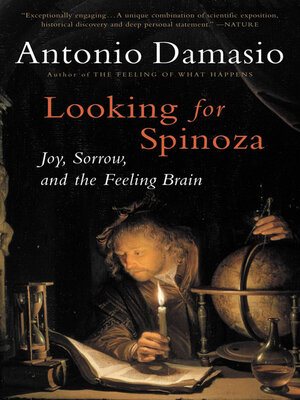
Sign up to save your library
With an OverDrive account, you can save your favorite libraries for at-a-glance information about availability. Find out more about OverDrive accounts.
Find this title in Libby, the library reading app by OverDrive.



Search for a digital library with this title
Title found at these libraries:
| Library Name | Distance |
|---|---|
| Loading... |
A famed neuroscientist explores the emotions that make life worth living in “clear, accessible, and at times eloquent prose” (San Francisco Chronicle).
In the seventeenth century, the philosopher Spinoza examined the role emotion played in human survival and culture. Yet, the neurobiological roots of joy and sorrow remained a mystery. Today, we spend countless resources doctoring our feelings with alcohol, prescription drugs, health clubs, therapy, vacation retreats, and other sorts of consumption; yet the inner workings of our minds—what feelings are, how they work, and what they mean—are still largely an unexplored frontier.
Here, bestselling author and distinguished scientist Antonio Demasio concludes the groundbreaking trilogy he began with Descartes’ Error by drawing on his innovative research and experience with neurological patients to examine the cerebral processes of human emotion. With scientific expertise and “a flair for writing,” he navigates the neurology of feelings (The New York Review of Books).
“Damasio has the rare talent of rendering science intelligible while also being gifted in philosophy, literature and wit.” —Margaret Jacob, Los Angeles Times
“Exceptionally engaging and profoundly gratifying . . . Achieves a unique combination of scientific exposition, historical discovery and deep personal statement regarding the human condition.” —Nature
“Damasio . . . succeeds in making the latest brain research accessible to the general reader, while his passionate Spinozist reflections make that data relevant to everyday life.” —Publishers Weekly
In the seventeenth century, the philosopher Spinoza examined the role emotion played in human survival and culture. Yet, the neurobiological roots of joy and sorrow remained a mystery. Today, we spend countless resources doctoring our feelings with alcohol, prescription drugs, health clubs, therapy, vacation retreats, and other sorts of consumption; yet the inner workings of our minds—what feelings are, how they work, and what they mean—are still largely an unexplored frontier.
Here, bestselling author and distinguished scientist Antonio Demasio concludes the groundbreaking trilogy he began with Descartes’ Error by drawing on his innovative research and experience with neurological patients to examine the cerebral processes of human emotion. With scientific expertise and “a flair for writing,” he navigates the neurology of feelings (The New York Review of Books).
“Damasio has the rare talent of rendering science intelligible while also being gifted in philosophy, literature and wit.” —Margaret Jacob, Los Angeles Times
“Exceptionally engaging and profoundly gratifying . . . Achieves a unique combination of scientific exposition, historical discovery and deep personal statement regarding the human condition.” —Nature
“Damasio . . . succeeds in making the latest brain research accessible to the general reader, while his passionate Spinozist reflections make that data relevant to everyday life.” —Publishers Weekly







